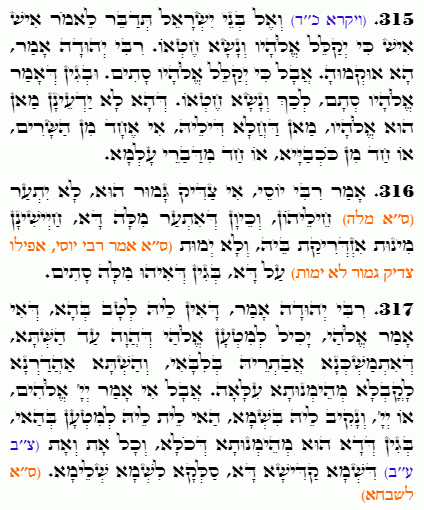Daily Zohar # 4592 – Emor – You can belittle a god, but not the Holy Name
Daily Zohar 4592

Hebrew translation:
316. אָמַר רַבִּי יוֹסֵי, אִם הוּא צַדִּיק גָּמוּר, לֹא יְעוֹרֵר (דָּבָר) אֶת הַכֹּחַ שֶׁלָּהֶם, וְכֵיוָן שֶׁעוֹרֵר הַדָּבָר הַזֶּה, חוֹשְׁשִׁים שֶׁנִּזְרְקָה בּוֹ מִינוּת, וְלֹא יָמוּת (אָמַר רַבִּי יוֹסֵי, אֲפִלּוּ צַדִּיק גָּמוּר לֹא יָמוּת) עַל זֶה, מִשּׁוּם שֶׁהוּא דָּבָר סָתוּם.
317. רַבִּי יְהוּדָה אָמַר, דָּנִים אוֹתוֹ לְטוֹב בָּזֶה, שֶׁאִם אָמַר אֱלֹהַי, יָכוֹל לִטְעֹן: אֱלֹהַי שֶׁהָיָה עַד עַכְשָׁו, שֶׁנִּמְשַׁכְתִּי אַחֲרָיו בְּלִבִּי, וְעַכְשָׁו חָזַרְתִּי כְּנֶגֶד הָאֱמוּנָה הָעֶלְיוֹנָה. אֲבָל אִם אָמַר יְיָ אֱלֹהִים, אוֹ יְיָ, וְנָקַב אוֹתוֹ בִּשְׁמוֹ – לָזֶה אֵין לִטְעֹן בָּזֶה, מִשּׁוּם שֶׁזּוֹהִי אֱמוּנַת הַכֹּל, וְכָל אוֹת וְאוֹת שֶׁל הַשֵּׁם הַקָּדוֹשׁ הַזֶּה עוֹלֶה לַשֵּׁם הַשָּׁלֵם (לְשַׁבֵּחַ).
.
Zohar Emor
Continued from previous DZ
#315
Leviticus 24:15
“וְאֶל בְּנֵי יִשְׂרָאֵל תְּדַבֵּר לֵאמֹר אִישׁ אִישׁ כִּי יְקַלֵּל אֱלֹהָיו וְנָשָׂא חֶטְאוֹ.”
“And speak to the children of Israel, saying: Any man who curses his God shall bear his sin.”
Rabbi Yehuda said, “This has already been explained, but ‘who curses his God’ is stated in general terms. Because it says ‘his God’ without specifying, therefore, ‘he shall bear his sin.’ He is not punished because we do not know who his God is, whom he reveres—whether it is one of the appointed ministers, one of the stars, or one of the rulers of the world.”
#316
Rabbi Yossi said, “If he were a completely righteous person, he would not have invoked their powers to curse them. Since he did so, we fear that heresy has been cast upon him. However, he will not die for this because his statement is vague, as he did not specify who his God is.”
#317
Rabbi Yehuda said, “We judge him favorably in this matter. If he said ‘my God’ and cursed it, he can argue, ‘The God I followed until now, I was drawn to in my heart, but now I repent and accept the true faith.’ However, if he said ‘Hashem Elokim’ or ‘Hashem’ and explicitly pronounced the Name, he cannot argue anything in this case. This is because it is the faith of all, and each letter of the holy Name corresponds to the complete Name.
Lesson;
When the curse is vague, using a term like ‘my God,’ there is room to judge the person favorably, allowing for the possibility of repentance and acceptance of the true faith. The individual can claim a transition from following a mistaken belief to accepting the true faith, reflecting the act of Teshuva.
If the curse specifically targets the sacred Name, such as ‘Hashem Elokim’ (YHVH ELHYM) or ‘Hashem,’ there is no defense. This explicit mention leaves no room for ambiguity and shows direct disrespect towards the faith.
Each letter of the holy Name is significant and corresponds to the complete Holy Name, underscoring the gravity of explicitly cursing it.
Invoking the sacred Name in a negative context has profound implications. It’s like going against the forces that keep the world in existence. Going against the Holy Name is like moving out of Light into darkness.
{||}

 Previous: Emor
Previous: Emor

